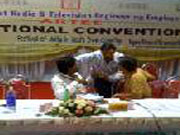News
ARTEE convention shows Indian union’s unity, commitment to democracy

If you want a conference report with number of delegates, lists of guests, the presidential/General Secretary speech and perhaps even something about the resolutions adopted, stop reading now.
“Festival of Unity in God's Own Country” was the banner over the Convention of ARTEE, UNI Global Union's affiliate representing television and radio workers in India.
It was held in a theatre named after Tagore, the great Indian playwright, poet and painter. He was the first Asian, indeed first non-European, to win the Nobel Prize for literature. As such, he was a pillar of 20th century Indian-- even global-- culture.
I have been fortunate to visit many union conferences in many countries with different languages, cultures and traditions. They have ranged from a conference with more than 9000 delegates to one with less than 20.
They ranged from near anarchy, with delegates clambering over tables and chairs to punch each other, to what looked like a gathering of Trappist monks forbidden to speak and bowing to the high priest on the platform.
Compared to any of them this ARTEE convention was remarkable.
Sure there were the opening speeches from invitees, the President and General Secretary, representatives from management and the UNI Deputy General Secretary. And the management representatives showed respect for and praised the union. And the union reciprocated with praise for the management.
But as things progressed it was clear that while respecting each other and showing respect, this is no soft relationship or easy partnership. The union gets respect because of its strength. It gets respect because it has power to mobilise its members.
Criticism of the way workers have been treated by management or government was loud and unshackled.
Chief among the grievances is that while members are recognised as government employees, they get less pay and worse benefits than other government employees.
Delegates want something done about it.
Loudly, even noisily, delegates expressed their views.
Detailed questions are thrown at the officials who are expected to answer. And they do with as much vigour and volume as the way in which the questions were posed.
Delegates shout loudly from the hall to the platform or sometimes to each other. Delegates go to the rostrum to interrupt speakers, including the President, if they feel a question needs to be asked or a comment made which will not wait.
Delegates insist on making their points even in the face of appeals for brevity from the President.
But even at the loudest or most emotional moments, there is never a feeling that it will go too far or divide the union. It is as if everyone instinctively knows this open, frank debate is the strength and power of the union. This is what makes it stronger.
And whatever arguments go on inside the union, outside it is united.
So it was a wonderful festival of unity and democracy in the Indian tradition and culture. And it could be an example to many other unions.
And sometimes it should make some of us who complain about wasting time at airports or between meetings just a little humble.
Delegates here work between 9 in the morning to 9 in the evening. And even in the hour's lunch break the discussions continue.
And one delegate told me how he came from the North East near the China border. He had spent five and a half days in a train to get to the convention and would take the same time to get back.
I wondered: How many of us would be willing to do that?



Philip Bowyer, UNI's Deputy General Secretary, is at the ARTEE Convention in Kerala, India, from 2-4 August.

